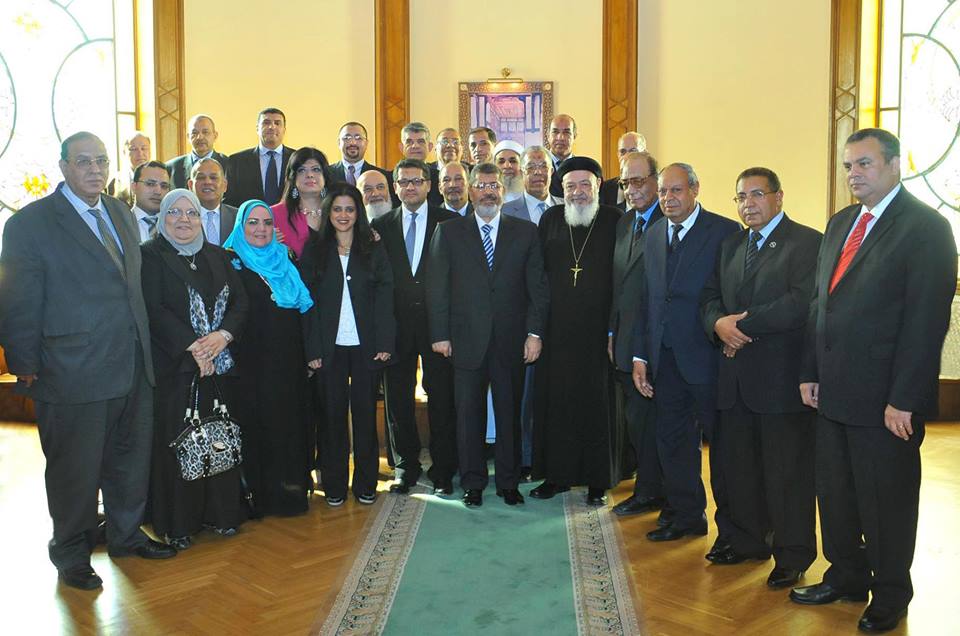Anti-rumors law hotly debated; “The Da Vinci Code ban criticized
CAIRO: The number one news story throughout the week was the parliamentary discussion of and voting over the new judiciary law. The gap in interpreting events continued to exist between state-run and opposition papers, albeit to a lesser degree compared to previous weeks. The coverage of the new law also brought the parliamentary debate over the proposed anti-rumors law into the spotlight.
Front page articles in both opposition and state-run papers agreed that the meeting between the Judges Club and parliament speaker Ahmed Fathy Sorour was composed and fruitful.
Al-Wafd, however, focused on the nine points of differences the two sides discussed regarding the law, voicing Al-Wafd Party s disapproval of the law. State-run newspapers were more concerned with praising the president for his efforts in the crisis.
An Al Ahram editorial said that the changes in the judiciary law indicate, among other things, President Hosni Mubarak s concern with guaranteeing and supporting judicial independence.
In Al-Akhbar, Khaled El Meiry was critical of the Judges’ Club’s dismay over the law, which he characterized as: answering their basic demands. He said the club wants to be an entity parallel to the Higher Council of Judiciary.
Aside from El Meiry s, editorials shifted from analyzing the once-escalating crisis between the Judges’ Club and the government to analyzing the details of the disputed laws. Makram Mohamed Ahmed wrote in Al Ahram that making a judgment in the dispute over the formulation of the Higher Council of Judiciary is simply choosing between adopting elections with all their risks or maintaining the seniority system with all its rigid rules.
There is unanimous agreement among judges, wrote Ahmed, that the new law doesn t grant a type of judicial independence that wasn t there before, but this represents a step on the right path because it boosts the independence of the judiciary.
In the same paper, Fahmy Howeidy expressed skepticism over the future of the judiciary law. Referring to previous constitutional amendments, most notably Article 76 and the intention of replacing the Emergency Law with a terrorism law, Howeidy wrote that he fears the change would be superficial, affecting only minor issues while leaving the essence intact.
He tied the law with the proposal of establishing an anti-rumors law. Describing the latter as a joke that would be a disaster if it were actually passed by the parliament, Howeidy said the proposal is perplexing. In a time when freedom is most wanted, he continued, transparency is the only way to fight rumors. Confusion arose with the secrecy that surrounded the early discussion of the judiciary law, he added.
Other writers also picked up on the anti-rumors law and the MP who presented it. In Al-Masry Al-Youm, Hasanein Koroum discarded suggestions that National Democratic Party (NDP) MP Hesham Mostafa Khalil had proposed the law in an effort to undermine other laws aimed at canceling prison sentences in publishing cases.
Koroum said the anti-rumors law was Khalil s way of restoring his relationship with Gamal Mubarak; Koroum saw it as an indirect effort to fight campaigns against Mubarak. In last year s parliamentary elections, Khalil defeated NDP candidate Hossam Badrawy but later joined the NDP after winning the elections as an independent candidate. Koroum claimed that this has upset the relationship between Mubarak and Khalil and even the proposal of the anti-rumors law can’t restore it.
The parliamentary discussion and decision to ban “The Da Vinci Code, both in film and book form, also took prominent spots. There was a united stance against the parliament and Minister of Culture Farouk Hosni for the ban they initiated.
Expressing dismay over the ban, Nawal Mostafa wrote in Al-Akhbar that the question that poses itself is: Can a fictional thriller film change a rooted conviction?
Mostafa said a novel can change parts of ideologies but in the end “The Da Vinci Code readers are the intellectual elite. The novel is not assigned to school or university students, she added. If people judge creative work by religious standards, whether Islamic or Christian, then creativity won t exist anymore, she said.
In Al Ahram, Salama Ahmed Salama said no one can ask the current parliament to be more liberal in defending the different forms of freedom; the majority wants to abide more to traditions and religion while there is a minority that sets itself up as a defender of religion and faith. This is fine, he continued, if it doesn’t lead to a fatal intellectual disaster.
Salama said that in “The Da Vinci Code discussions, fanaticism won, as the parliament transcended the Church s report and asked for the ban; the church only criticized the film but didn t request a ban.
I had expected that some movie theaters would refuse to screen the film, but I didn t expect the parliament s decisions to exceed the Church s and the Vatican s response, Salama added.


